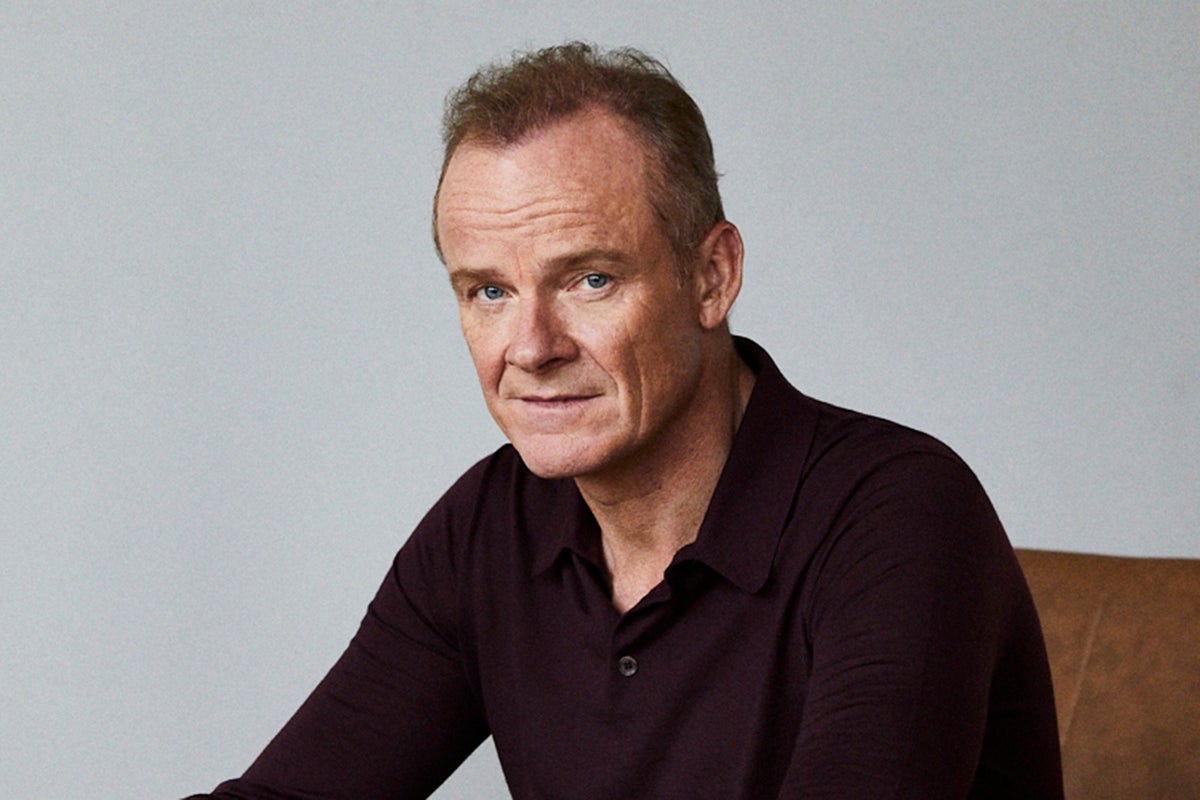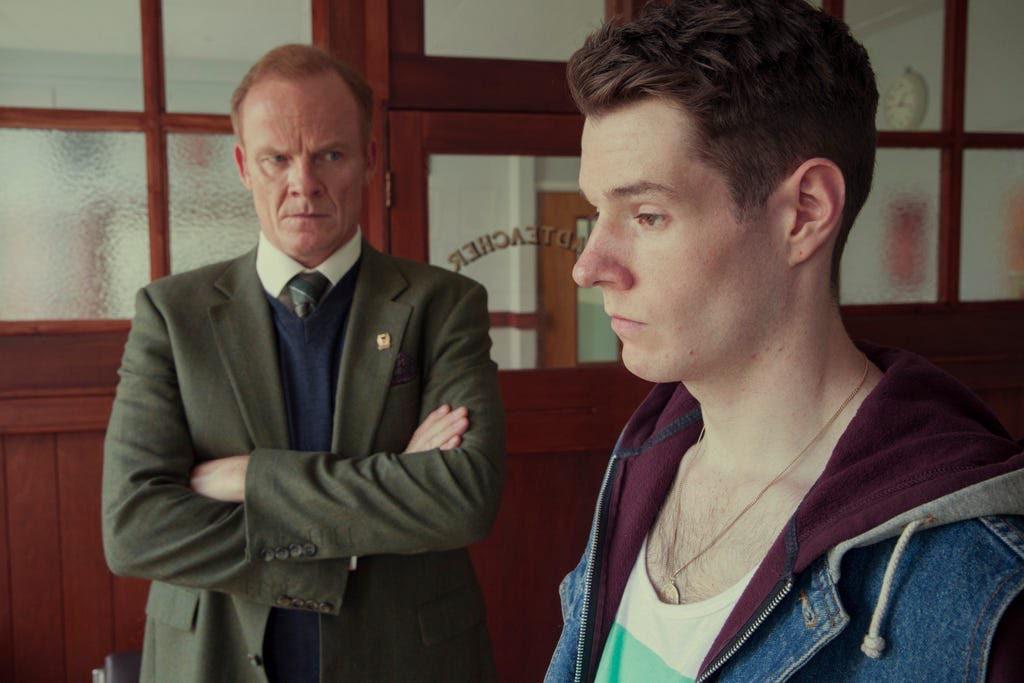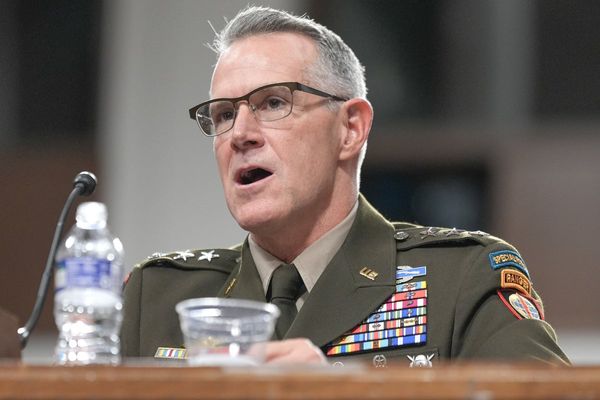
Commuters travelling between Surrey and London by train in recent weeks might have borne witness to a rather unusual scene: Alistair Petrie, the distinctive British actor known as Sex Education’s buttoned-up headmaster Mr Groff, reciting lines of Shakespeare under his breath and surrounded by scrawled notes. “I don’t care if people think I’m a lunatic,” he says with a goofy laugh. “There’s a sort of unwritten etiquette about commuting that seems to permeate, but I’m just there, on a busy train, muttering Shakespeare. So I guess I’m part of the zoo!”
In case you hadn’t guessed, the 54-year-old is actually starring in a Shakespeare play – Robert Hastie’s production of Hamlet, at the National Theatre. Olivier winner Hiran Abeysekera is the tragic hero, and Petrie is cramming his lines on the 8:28 service to Waterloo for the prince’s uncle and nemesis, Claudius, King of Denmark. “Early on, I decided that Claudius doesn’t know that the play is called Hamlet,” says Petrie, as he sips a cup of tea in a light-filled office in the National. “To him, the play’s called Claudius, and he’s in a tragedy of his own. He has ascended to the throne through, admittedly, a rather nefarious methodology, but he’s been waiting to do this almost all his life. He’s been the spare, but now he’s the king.” Essentially, Claudius has what would be known in modern parlance as “main character energy”.
The play’s themes, as with so much of Shakespeare, chime heavily with today’s issues. “There’s a febrile atmosphere in Hamlet, you have a kingdom surrounded by the possibility of war, and wars being kept at bay. So [the parallels are] kind of staring us all in the face,” says Petrie.
I get the impression that the actor – “Al” to those who know him – would natter away all day did he not have to return to rehearsals for a three-hour production. He’s candid, kind, and a true thesp, his voice strong and assertive, his hand gestures grand and sweeping. In person, his face is more boyish and less severe than on screen – where he’s often the villain – and he sits with his back very straight and legs crossed, stripy socks and trainers poking out from under the table.
Hamlet marks Petrie’s first return to the stage for 11 years; after a gruelling six-month run of Shakespeare in Love in 2014, he was afraid to go back. “That was a challenge,” he says, citing “tricky” rehearsals and “the pressure of the Disney budget” on the creative team. The play, an adaptation of the 1998 film, got brilliant reviews, but for Petrie, it came at the wrong time.
“It collided with things that were going on in my personal life,” he says. Petrie is married to the actor Lucy Scott, with whom he shares three sons, all in their twenties. “My children were younger, and I underestimated how hard theatre can be to do over a long period of time. To also be a husband and a father and all of those things that are as important to me as my professional life, something had to give. I fully underestimated how much theatre can bulldoze through it all. I was shattered and I completely lost my theatre mojo.”
Eventually, he decided he would come back to the stage for “the right play, right part, right director, right venue” – and Hamlet ticked all four boxes.

His break from the boards gave him time to focus on other projects. There was the BBC’s awards-sweeping le Carré adaptation The Night Manager (more on that later), supernatural horror The Terror, Fox drama Deep State, a role as a rebel general in Rogue One: A Star Wars Story, and, most notably, Sex Education in 2019. The Netflix show, a groundbreaking look at teenage sexual discovery complete with masturbation montages we can never unsee, was an immediate hit. Petrie remembers being at a cafe with co-stars Aimee Lou Wood and Connor Swindells the Monday after the first season dropped, and noticing about half of the customers staring and pointing at them.
It did feel like everyone watched the show, whether you were a teenager, a parent, or a pensioner. Indeed, 55 million tuned into it at its peak. Petrie recalls a gay man in his eighties running out of a London restaurant, napkin tucked into his shirt, to tell him how much the series meant to him. My own mum and sister were actually brave enough to watch it together, albeit often through their fingers.
Did Petrie use the show to wriggle out of giving his sons “the talk”? “Funnily enough, I was always determined to be very open about that kind of thing,” he says, with a thoughtful scratch of the chin. “When they were getting into their slightly more mature teen years, and girlfriends were popping up, I thought, well, if I get cagey about having a conversation about what porn represents, and a physical relationship with another human being in terms of respect and consent, then I’ll be completely failing.” His sons did watch the show – albeit without him, and separately, in their bedrooms – and even appeared in season three as extras.
-and-cast-in-rehearsals-for-Hamlet-at-the-National-Theatre--(c)-Sam-Taylor.jpeg)
In lesser hands, Petrie’s Mr Groff could have been nothing more than a pantomime villain – a man bullied by his father who grows into a bully himself. But he ended up having one of the most satisfying story arcs of the whole ensemble. Petrie imbued him with a sweetness and vulnerability that elevated the character beyond the basics. And his scenes of reconciliation with Swindells, who played his son Adam, were the best and most touching moments of the final season. “At the beginning, when I was asked to do it, I rather flippantly said, ‘Oh, you know, he’s a headmaster who yells at teenagers,’” says Petrie. “But it took on a wonderful life of its own. Playing the bad guy, so to speak, is really fun, but your job is really to find out what makes them tick.”
He loved playing Adam’s dad. “Connor became like my son,” he says. “We are incredibly close. We speak every day on the phone. And I’ve watched this young man grow up over the past six years. I mean, I officiated at his wedding. Of all the things that show has given me, it’s him, no question. He’s really special to me.”
But after four seasons, it was time for Sex Education to end. Not least because most of its stars, including series lead Asa Butterfield, were ceasing to plausibly pass as teenagers. “There was a hilarious moment where one of the cast came into my trailer during the final season, and she said, ‘I’ve just done a scene with Asa, and he looks about 30!’” recalls Petrie with a hoot of laughter. “So it just came, as these things do, to a natural end. As an actor, you’re used to moving on, and you don’t want to string something out.”
I love the emotional openness of actors
He looks upon the younger cast “like a proud parent”, he says. “It feels like it’s one of those brilliant jobs that you do where, in however long, when they’ve all got a couple of Oscars and Emmys in their back pockets, you can look across a crowded room and wink at each other – just because you shared something really special, which was right at the beginning.”
Petrie’s casting in Sex Education came at a sliding-doors moment in his career. Just days before, he’d found out he’d lost out on the part of Prince Philip in The Crown to Tobias Menzies. “I was in the back of a minibus, struggling with norovirus, when I got the call,” he says. “That was a rough old day. Ha ha!”
He was crushed, but days after that rejection, was approached to play Mr Groff. “It’s the best thing that could have happened, not least because I did Sex Education, but also because of the people it’s brought into my life and the ongoing collaborations that I have with them.” He is currently producing a new series created by George Robinson, who played Isaac. “I don’t know whether you believe in fate, God, Muhammad, Yahweh, it doesn’t matter, but whoever or whatever you believe in, then, if one gift was taken away from me, an equally if not more beautiful gift arrived in my lap, and that was Sex Education.”
Petrie is quite philosophical about it all – and about how he got into acting in the first place. He was born in Yorkshire, but because his dad was an RAF pilot, the family moved every three years around the Middle East, Europe and Africa. All this upheaval meant he craved a sense of belonging. “It’s a really odd thing to say, but I feel safe among other actors,” he says. “I love their emotional openness.”
He went to study at the London Academy of Music and Dramatic Art, and has worked consistently in theatre, television and film since the Nineties. Next, he’s starring in season two of The Night Manager, which is finally coming back after a nine-year wait. He’s returning as Sandy Langbourne, the heinous financial director of Hugh Laurie’s arms dealer Richard Roper. Le Carré, who died in 2020 aged 89, was a huge fan of the first season. “I’m gonna hazard a guess,” says Petrie, “I think he would be very proud of the new one. But obviously there was no novel to base it on, so it’s a really hard thing to pull off.”
There was a lot of umming and ahhing, says Petrie, over whether to bring the show back, and “various writers came and went trying to crack that very, very difficult nut”, but in the end, “David Farr [who wrote the first season] has delivered scripts that have an amazing, Shakespearean, almost Greek tragedy at the heart of it. It’s really good,” he nods emphatically. “Really good.”
He catches himself, and chuckles at his own enthusiasm. “I’ve never lost my love of it at all, in thirty-something years of doing it. Never wanted to give it up.”
It’s time for Al to get back to rehearsals. We leave the room and he keeps on chatting, all the way through the National’s winding corridors, until I get to the lift. One final cheery wave, and off he goes, to find out what makes his next villain tick.
‘Hamlet’ is on at the National’s Lyttelton Theatre until 22 November 2025
James McArdle: ‘There’s ego in theatre too! It’s vanities across the board’
Edinburgh Fringe 2025 defied storms and Oasis to deliver something essential
After Baby Reindeer, Fringe artists are refusing to sell their trauma for success
Andy Nyman: ‘People worry about getting cancelled – The Producers doesn’t care’
Tilda Swinton as toilet water? How Julio Torres pulls off the impossible in Hollywood
Sean Hayes: ‘I love Will & Grace but when I was in it, I was thinking how to get out’







